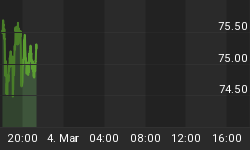"Just allow it...just admit it. It doesn't matter where the inflation comes from. Just let it stay..."
SLASHING the Bank of England's base interest rate to an historic low of 0.5% was supposed to "rebalance" the economy...tipping it away from galloping consumption towards an export-led recovery.
But all that the Pound's slump since rates began sinking in March 2008 has done so far, however, is gift a 50% gain to UK gold owners.

"While we were hit with a great recession, we now know that the world has indeed avoided a great depression," said UK prime minister Gordon Brown at a Reuters press conference in London this morning.
Just as with the war in Iraq, however - another "shock and awe" campaign planned with little thought for the collateral damage - we'll never know how things would have panned out if brave men like Brown hadn't done "whatever it takes". And just like in Iraq, victory has been declared way too early.
New data today showed industrial production in the UK sinking to 1991 levels. The employment rate has sunk back to 1996 levels, meaning a net loss of private-sector work when you allow for Brown's intervening civil-service jobs jamboree. And despite the collapse in Sterling, the UK's trade deficit has been widening for more than a year, verging at last count on the record 3% of GDP hit at the very top of the credit bubble, 2005-2008.
"Let us be clear," says Brown, "the economy is growing, but remains fragile."
And the cost of this success...?
- The interest paid on the average cash ISA account now lags retail-price inflation by 3.3 percentage points per year - the worst real returns to cash in over three decades (source: Bank of England and ONS data);
- Annuity rates have fallen by 6p in the pound, offering barely £6,000 per year on pension savings of £100,000 (source: WilliamBurrows.com);
- Real wage growth - on average, and after inflation - has gone negative for the first time since 1974, falling well over 1.5% since March 2008 (source: ONS data).
Not quite depleted uranium. But just as insidious.
"In the medium to long term, inflation has to come through," says Nouriel Roubini's latest fixed-income hire at RGE Monitor, former Citi managing director and wealth-management strategist, Arun Motianey.
"Just allow it...just admit it. It doesn't matter where the inflation comes from. It doesn't have to be through monetization of public-sector deficits, although at a pinch we may need to do that. What I am saying is that if we do get cyclical [demand-driven] inflation, then let that inflation stay...allow it help to write down the real value of debt."
Naturally, Motianey was talking to CNBC this week because he's got a book to promote. (We're all shills in the end, remember.) And naturally, so as to make a few a sales, his policy prescriptions conclude with handy tips for investors on "How do you preserve purchasing power, how do you preserve savings?" amid the inflation which Motianey says we should (and shall) get.
We can have it both ways, in short. Debt can be inflated away, while creditors are somehow protected. I can't say whether gold bullion is part of his saver's solution. But when fixed-income economists beg for inflation...and pretend that savers won't get screwed in the process...you've got to wonder where else you can hide.















